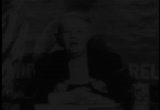|
Council for the Relief of Palestine Arab Refugees:
"Sands of Sorrow" (1950)
[This film is narrated by the eminent journalist Dorothy Thompson. She was the first U.S. journalist to be expelled from Nazi Germany, in 1934.]
Video is on the Web here: http://www.youtube.com/watch?v=lQ6lIsl-pHU
Still photos from the video: http://www.archive.org/details/sands_of_sorrow
Hit "Play All" to view the film.
This 28-minute film shows Palestinian refugees, two years after the Israeli conquest of Palestine.
Dorothy Thompson speaks on the refugee problem. Palestinian refugees live in tents in the Gaza Strip, are given blankets and food by Egyptian soldiers, and receive flour from UNICEF. A Lebanese priest conducts services. Refugees work as plumbers, carpenters, tailors, and shoemakers in the city of Jerusalem. Doctors vaccinate refugees against disease. The film shows the squalid living conditions in refugee camps, starving children, and emphasizes the hopeless condition of the refugees.
This item is part of the collection: Feature Films
Producer: Council for the Relief of Palestine Arab Refugees
Audio/Visual: sound, black and white
Keywords: Documentary; Palestine; Gaza; refugees
Creative Commons license: Public Domain
Write a review Reviews
Downloaded 5,974 times Average Rating: 




Reviewer: jimelena - 



 - December 13, 2006
- December 13, 2006
Subject: Oh man.
First let's look at the historic population of Palestine, then make a judgement.
Second, find out where these refugees originated from, it wasn't Palestine.
European intervention the previous 100 years in Palestine before this should be examined also.
It will take a lot of reading, don't just assume this movie is accurate.
Reviewer: on-a-quest - 



 - August 14, 2006
- August 14, 2006
Subject: Israeli War Crimes
instead of wondering why saudi arabia was not helping the refugees you have to ask why are the palestinian refugees in the first place.You cannot deny the fact that the palestinians are the modern version of the native americans. They were kick out their homes in the most unhumane fashion possible.Israel has committed and still is committing crimes against humanity.David Ben Gurion who is know as the chief architect of the state of Israel and revered as Father of the Nation said it best:
"We must use terror, assassination, intimidation, land confiscation, and the cutting of all social services to rid the Galilee of its Arab population.�
Reviewer: Amfortas - 



 - July 9, 2006
- July 9, 2006
Subject: What a piognant and sad historic film,,,
And to the reviewer above , this was the 1950's , at that time Suadi Arabia was not a wealthy country yet.
Reviewer: bestpbx - 



 - July 7, 2006
- July 7, 2006
Subject: Where are their Arab "brothers"
Someone explain to me why any Arab would have to live in a refugee camp under squalid or any other kind of conditions?
Why don't the wealthy Arabic nations help these people? Saudi Arabia has piles of money.
There is something fishy about this.






























